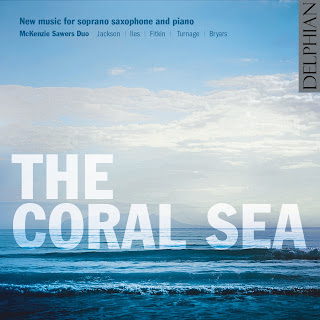Gabriel Jackson is perhaps best known as a composer of choral music but in The Choral Sea he displays and equally deft touch with instrumental forces. The Choral Sea is inspired by a photograph of the same name by Robert Mapplethorpe which in turn inspired a prose poem by Mapplethorpe's friend Patti Smith. Jackson's piece is in three movements, Prologue, Voyage and Litany, corresponding to the three sections of the poem with Jackson reflecting the construction of the poem in his music.
The result is an uneven distribution of movements (their respective lengths are 0:53, 12:39 and 3:12) but the piece reads well as a single span of music. Written in 1996-97, it was premiered by Martin Robinson and Antony Gray at the Tate Gallery. It opens with a piano introduction followed by a soulful, chant-like solo for the saxophone with just the occasional piano in the bass.
Initially the piano does not accompany the saxophone but dialogues with it, as chant-like solos develop increasing rapture. The work develops a more structured feel, with the piano accompaniment becoming strikingly glittery. The saxophone part increases in its rapturousness until the opening material returns.
The Cd booklet doesn't include the poem or the picture, but Jackson's haunting music and the McKenzie Sawers Duo's performance make you want to seek it out.
Graham Fitkin has written a considerable quantity of music for the saxophone in all its forms. Gate (2001) is a toccata like piece, full of energy with infectious pointed rhythms in the saxophone. Fitkin's writing for the instrument has distinct echoes of jazz. As the piece progresses it increases in intensity and difficulty, it is gripping in the way it carries you along.
Nikki Iles is a renowned jazz pianist and composer and her jazz background is never far away in Alma Venus (1996). It opens with a quietly intense piano solo with jazz/blues hints over which comes a long lined saxophone solo, joining in with its soulful singing. As the piece develops Iles introduces greater rhythmic energy, preserving the works engaging feel.
Fitkin's second piece on the disc, Glass (1998) is surprisingly simple, just a rapturous long singing line from the saxophone with quiet chords supporting it in the piano.
Mark-Anthony Turnage is another composer for who the saxophone seems to be an essential instrument in its armoury. Memorial consists of two short elegies for unaccompanied solo saxophone. The first, Trier, was composed in memory of Stephen Trier, a teacher at the Royal College of Music, and the second is a memorial to Mark-Anthony Turnage's mother. Both pieces combine a lyrical feel with an edginess to the melodic material with wide jumps and awkward intervals. They receive a quietly intense performance from McKenzie.
Gavin Bryars has collaborated with a number of jazz musicians. The jazz saxophonist Jan Steele commissioned Allegrasco. The original score is for soprano saxophone and piano, but from the outset the piece also had links with the clarinet as Bryars was influenced by Ferrucio Busoni's Elegie (1921) for clarinet and piano which was in turn influenced by the playing style of the first performer, Edmondo Allegra (hence the pun of the title). But the original scoring for saxophone preserves links with Bryars' opera Medea which includes two saxophones in its scoring. This results in a fascinating web of links, because Busoni's Elegie is linked to his opera Doktor Faustus.
It is a long piece, some 18 minutes. It starts with an evocative saxophone singing over chords, and this is how it develops. The tempo might speed up, the number of notes might increase and so does the intensity but the general hypnotic feel is preserved.
The fascinating thing about this disc is that the pieces all have a similar feel, the way the composers write for the saxophone and the general musical background. To a certain extent this is because of the jazz influenced background to the pieces, but it also hints at a similar feel for the way the instrument is written for. The pieces on this disc have a commonality about them which makes for a satisfying programme.
The performances from the McKenzie Sawers Duo are exemplary and both give sympathetic account of all the music on the disc and create some highly evocative performances. The result is a fascinating and rather appealing disc.
The Coral Sea - new music for soprano saxophone and piano
Gabriel Jackson (born 1962) - The Coral Sea [16.44] world premiere recording
Graham Fitkin (born 1963) - Gate [8.25]
Nikki Iles (born 1963) - Alma Venus [7.40]
Graham Fitkin - Glass [2.51]
Mark-Anthony Turnage (born 1960) - Two Memorials [4.56]
Gavin Bryars (born 1940) - Allegrasco [18.12] world premiere recording
Sue McKenzie (soprano saxophone)
Ingrid Sawers (piano)
Delphian Records DCD34121 [58.55]
Elsewhere on this blog:
- Win tickets to Live by the Lake, Kenwood
- Tete a Tete: the Opera Festival - a second helping
- Billy Budd at Glyndebourne
- Tete a Tete: the Opera Festival - 7 August
- Viktor Bijelovic - Empassioned - CD review
- John Eliot Gardiner conducts Bach at the Proms
- Grimeborn - Magic Flute
- The Bear goes Walkabout
- Stile Antico - Phoenix Rising - CD review
- Dinner opera at the diner - Roma and La Plus Forte
- Dai Fujikura - Flare - CD review
- Edward Cowie - Gesangbuch - CD review
- Home
The Coral Sea - music for saxophone and piano; McKenzie Sawers Duo
Reviewed by Robert Hugill on Aug 13 2013
Rating:
Reviewed by Robert Hugill on Aug 13 2013
Rating:












No comments:
Post a Comment